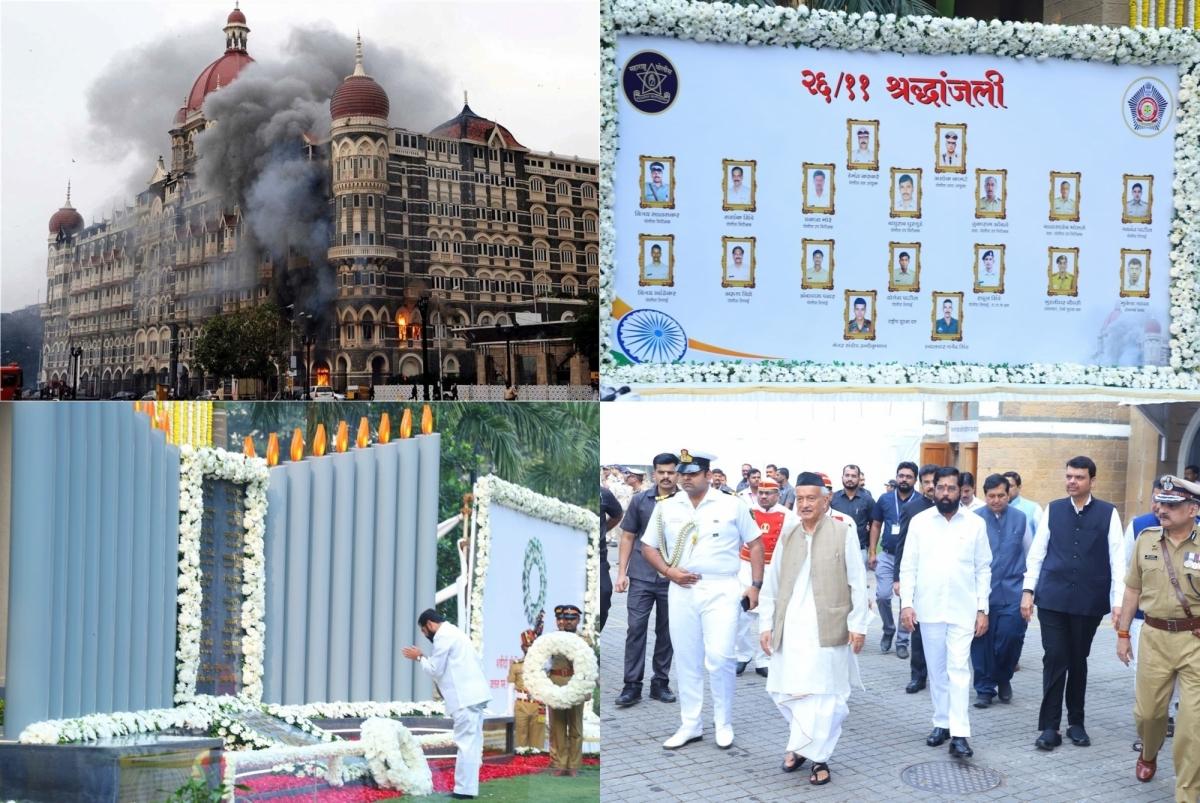


As Maharashtra commemorated the 16th anniversary of the 26/11 terror attacks, key figures from the state came together to pay their respects at a memorial in Mumbai. The event was attended by Chief Minister Eknath Shinde, whose upcoming resignation is set to create political turmoil and potentially form a new government. The day also saw tensions rise in Udaipur's royal family feud, Trump's plans to appoint Kash Patel to a key position, and unrest in Bangladesh over the arrest of a Hindu leader.
Mumbai Terror Attack: 16 Years of Remembrance and Unresolved Issues
On November 26, 2008, Mumbai, India, witnessed one of the deadliest terror attacks in its history. The coordinated strikes by Pakistani militants left 166 people dead and over 300 injured.
Background
The Mumbai terror attacks were carried out by 10 Lashkar-e-Taiba (LeT) terrorists who sailed from Karachi, Pakistan, to Mumbai by boat. They targeted various sites, including the Taj Mahal Palace Hotel, the Oberoi Trident Hotel, the Chhatrapati Shivaji Maharaj Terminus railway station, and the Jewish Center.
The terrorists held hostages and engaged in fierce gun battles with security forces for over three days. The Indian Army, Navy, and police eventually regained control, killing nine of the attackers and capturing one, Mohammad Ajmal Kasab.
Commemoration and Political Turmoil
On the 16th anniversary of the attacks, Maharashtra commemorated the victims with a memorial service in Mumbai. Amidst the remembrance, political tensions arose as Chief Minister Eknath Shinde faces resignation and a possible government change.
Impact and Aftermath
The Mumbai terror attacks had a profound impact on India and the world. They highlighted the threat of cross-border terrorism and led to increased security measures at airports, ports, and other vulnerable targets.
The attack also strained relations between India and Pakistan. The Indian government accused Pakistan of supporting LeT, which is based in the Pakistani city of Lahore. Pakistan denied the allegations but vowed to cooperate in the investigation.
Top 5 FAQs and Answers
Q1: Who was responsible for the Mumbai terror attacks? A1: The Pakistani militant group Lashkar-e-Taiba (LeT).
Q2: How many people were killed in the attacks? A2: 166 people.
Q3: Was anyone caught and convicted for the attacks? A3: Yes, Mohammad Ajmal Kasab, one of the attackers, was captured and sentenced to death in 2009.
Q4: What were the long-term consequences of the attacks? A4: Increased security measures, heightened tensions between India and Pakistan, and a renewed focus on counter-terrorism efforts.
Q5: What is the current status of the investigation into the attacks? A5: Pakistan has not fully cooperated in the investigation, and several suspects remain at large. The Indian government continues to press for justice for the victims.

Union Home Minister Amit Shah spoke at the inauguration of the 60th DGsP/IGsP conference in Raipur where he stated that Naxalism in India will be fully eliminated before the next conference. He also highlighted the government's efforts in strengthening the security grid and providing permanent solutions to long-standing national security challenges. Shah emphasized the importance of intelligence and collaboration with agencies to tackle drug trafficking and organized crime. He also mentioned the strengthening of India's policing framework, making it amongst the most modern globally.

In a recent Q&A session, Professor Michael Clarke addressed the impact of a leaked call between Donald Trump's envoy and Russia on peace talks. He also discussed Putin's desire for a great legacy, which has led to a lack of pragmatism. According to Clarke, approximately 4,000 main battle tanks and 30,000 pieces of armoured equipment have been destroyed in the conflict, with Russia focusing on building more complex modern tanks. Don't miss out on these insightful answers from the expert.

Following his party's disappointing performance in the recent Bihar Assembly election, politician Prashant Kishor has raised concerns about the voting results, stating that they did not align with the public sentiment he witnessed during his campaign. Despite this setback, Kishor remains determined to build a stronger political organization and continue engaging with the public in preparation for future elections. He also addressed criticisms of his role as an election strategist, reminding critics that one loss does not define his political future.

Indian government under the leadership of Prime Minister Narendra Modi has introduced four new labour codes aimed at protecting the rights and well-being of 40 crore workers across the country. Union Minister Mansukh Mandaviya has hailed the move as transformative and a major step towards ensuring the welfare of the workforce. The new codes bring in much-needed changes such as formalisation and transparency through appointment letters, and universal social security coverage for all workers including gig and platform workers.

In Uttar Pradesh's Lakhimpur Kheri, a police constable is in hot water for allegedly forging a court order to clear his name in an old case, with the intention of securing a promotion. The fabricated document surfaced during an internal investigation, prompting authorities to file a fresh case against the constable. This incident adds to the growing issue of corruption and misuse of power within the police force.

The Supreme Court has directed the formation of a Special Investigation Team (SIT) to conduct a fact-finding inquiry against Vantara, an animal rescue and rehabilitation center in Gujarat, following allegations of non-compliance with laws and acquisition of animals. The SIT, headed by former apex court judge J Chelameswar, will also look into reports of irregularities and complaints from NGOs and wildlife organizations. Vantara has assured full cooperation to the probe and reaffirmed their commitment to animal welfare.

The ongoing family feud within the Rashtriya Janata Dal (RJD) continues to escalate as three more daughters of party patriarch Lalu Prasad Yadav have left the family residence in Bihar's capital Patna. This comes just a day after another daughter, Rohini Acharya, publicly denounced the family and quit politics following the party's poor performance in the recent elections. Amidst allegations of insults and mistreatment, the saga continues to unfold within the Yadav family.

In a special lecture series in Bengaluru, RSS chief Mohan Bhagwat emphasized on the Hindu identity as a responsible and proud son of Bharat Mata. He urged the Hindu society to come together and share the message of 'Vasudhaiva Kutumbakam' with the rest of the world. Bhagwat also recalled the RSS founder and its journey of facing opposition and growth through dedication and sacrifice of its volunteers.

As the West Bengal Assembly elections near, the political battle between Bharatiya Janata Party (BJP) and Trinamool Congress (TMC) has intensified on social media. Following the BJP's victory in Bihar, the party declared its hopes to defeat TMC in Bengal on a popular platform, while TMC leader Kunal Ghosh responded with a proverb highlighting the BJP's potential failure in Bengal. Despite BJP's confidence, TMC remains unfazed and asserts their strong hold in the state.

Congress leader and Leader of Opposition in Lok Sabha, Rahul Gandhi, was criticized by BJP's Shehzad Poonawalla for going on a jungle safari in Madhya Pradesh's Satpura Tiger Reserve instead of focusing on the ongoing Bihar elections. Gandhi had earlier claimed that "vote theft" had taken place in several states, including Madhya Pradesh. BJP's Poonawalla mocked Gandhi's "priorities" and referred to him as the "Leader of Paryatan and partying."